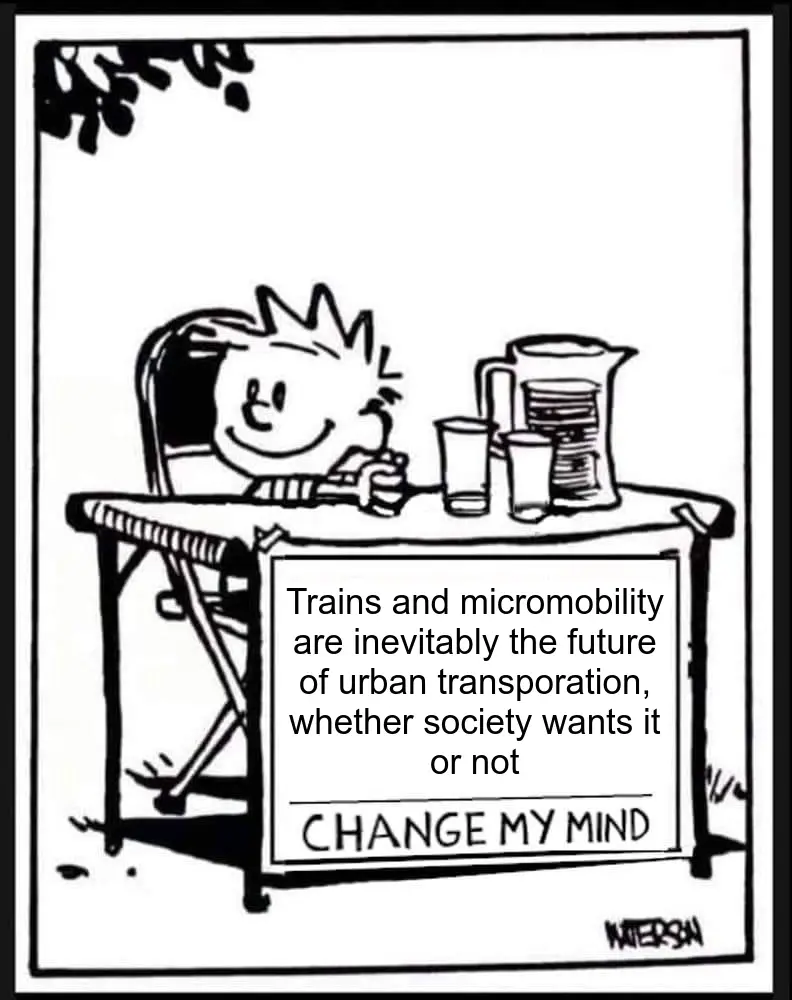Fuck Cars
A place to discuss problems of car centric infrastructure or how it hurts us all. Let's explore the bad world of Cars!
Rules
1. Be Civil
You may not agree on ideas, but please do not be needlessly rude or insulting to other people in this community.
2. No hate speech
Don't discriminate or disparage people on the basis of sex, gender, race, ethnicity, nationality, religion, or sexuality.
3. Don't harass people
Don't follow people you disagree with into multiple threads or into PMs to insult, disparage, or otherwise attack them. And certainly don't doxx any non-public figures.
4. Stay on topic
This community is about cars, their externalities in society, car-dependency, and solutions to these.
5. No reposts
Do not repost content that has already been posted in this community.
Moderator discretion will be used to judge reports with regard to the above rules.
Posting Guidelines
In the absence of a flair system on lemmy yet, let’s try to make it easier to scan through posts by type in here by using tags:
- [meta] for discussions/suggestions about this community itself
- [article] for news articles
- [blog] for any blog-style content
- [video] for video resources
- [academic] for academic studies and sources
- [discussion] for text post questions, rants, and/or discussions
- [meme] for memes
- [image] for any non-meme images
- [misc] for anything that doesn’t fall cleanly into any of the other categories
Recommended communities:
view the rest of the comments

Accessible trains that cover long distances (particularly high-speed rail) with trains that have floors at the level of the platform, like any European country with a competent public transport system. "Your mother" could also use something like a microcar to get to the station, which is allowed on bike lanes in the Netherlands as long as she can prove she has a disability.
No, but your sons would have an easier and safer time getting around with protected bike lanes, which is precisely why parents in the Netherlands never have to do school runs.
Your groceries will get to you faster the less unneccessary road users are there due to less induced demand. Do you honestly think countries that heavily rely on public transport don't have businesses that use the road regularly? Do you honestly think they have no emergency services (ambulances, firetrucks, police cars)? Have you actually thought about examples of how countries that actually exist using good public transport amenities and dense housing operate? Or are you just against change?
You meticulously avoided all hard questions. No problem, I just repeat them for you:
I wonder how a train is picking up my walking disabled mother from three Kilometres afar?
Will a train stop at my house to pick up my some two tons of gardening scraps per year?
At which time will it deliver my 100kg of groceries per week?
Also, How does a long distance train help my mother to get the 3km to her doctor?
How does a train help me buying building materials? Last week I bought 400kg of tiles. One drive with a car. It would have taken ten travels with a train if the train did stop inside the hardware store and directly in front of my house. Delivery by truck would have cost €50.
A "micro car" is not only insanely expensive, it also has no room for my mothers wheelchair.
My country has one of the best public transport systems in the western world. Everything you mention is available here. We can drive EVERYWHERE for a €49 flat rate and we have three bus stops within 100 metres. Still that doesn't help to solve a single problem I mentioned earlier.
Oh, and spending €245 for a family trip in a train? Not gonna happen. With the car it is a €10 trip.
But there is a actually a solution which could work: Robotaxis at very low prices per km. It wouldn't lower the traffic but reduce the parked cars and the TCO of personal transport.
Please give me moar bullshittery to mock you. It is fun.